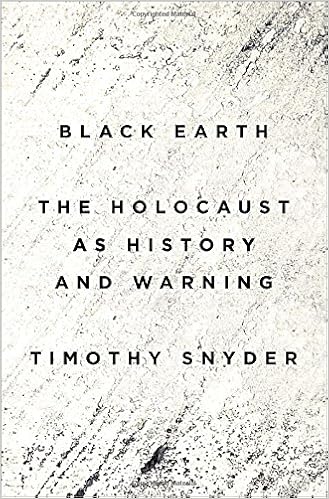
Black
Earth: The Holocaust as History and Warning by Timothy J.
Snyder
Timothy J. Snyder, Professor of History at Yale
University and no stranger to writing on the Holocaust has written an excellent
new book on the Holocaust entitled Black
Earth: The Holocaust as History and Warning. Snyder opens his book by focusing on the fountainhead
of Hitler’s views, his concept nature and his worldview. Politics and power were but empty stereotypes
that were left for the author to fill them with meaning. Snyder writes, “Reason was replaced by references,
argumentation by incantations…The totalistic idea of life as struggle placed
all power to interpret any event in the mind of its author (Introduction).” Science, for Hitler, was not about increasing
advancements for the benefit of the common man, “rather it was a completed revelation
of the law of racial struggle.” There were
no questions that would lead the scientist to further discoveries because this
would be disastrous for Hitler, for with new discoveries, his racial struggle
theory would come to its groundless state.
In the first chapter Snyder opens up to his reader’s
Hitler’s interpretation of the word Lebensraum. Coming into the German language as “habitat,”
it also had the household definition of “living room.” Snyder writes, “Nature was nothing more than
society, society nothing more than nature.
Thus there was no difference between an animal struggle for physical
existence and the preference of families for nicer lives (chapter 1).” How does this play out for Hitler? For one, these European populated lands,
specifically east of Germany could be colonized to increase the living space of
the racially superior. Further, as
Snyder reiterates in his book, these foreign lands would also be the place
where the killing fields existed, where the Nazis would send the Jews to
die. The sense of purging the land of
inferior peoples and inhabiting them would only increase the area for the
extermination of Jews, outside of the purview of those living in cities like
Berlin, Stuttgart, and Munich.
In chapter 11, Snyder chronicles the events and
people involved in the Polish Home Army and their attempts to counter the Germans. What I found to be most interesting was the
paper mills that were created by the Home Army to save many Jews. Snyder writes, “The Home Army also carried
out some actions to save Jewish lives, or support Jewish struggles. Probably the most significant way…was by the
production of false German documents.
Their famous “paper mills” could generate Kennkarten , indicating in fact that Jews were in fact Poles:…” The Jews had safety from their identity being
found out by German officers and belonged to an organization who came together
to fight.
This is a captivating book and one which I will go
back to and read again. With an amazing
ability to bring to light sources from many other languages, Snyder is
unparalleled in his abilities.
Thanks to Blogging for Books for the copy of this
book in exchange for an honest review.
Comments
Post a Comment